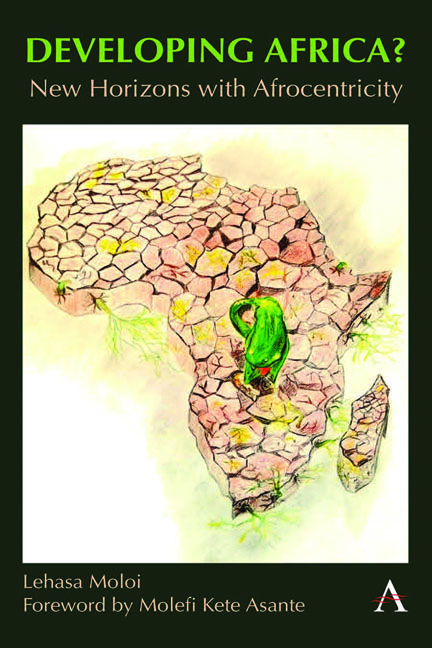Book contents
- Frontmatter
- Contents
- Foreword
- Preface
- Acknowledgements
- Relevance of the Dialogue
- Overview of the Book
- 1 Introduction
- 2 Theoretical Grounding: Afrocentricity’s Approach to Development
- 3 Critique of Eurocentrism and a Mapping of African Development Initiatives
- 4 Afrocentricity on the Significance of African History for Development
- 5 Afrocentricity on the Significance of Culture in the Conceptualization of an African Development Paradigm
- 6 Afrocentricity on the Significance of African Agency in Development in Africa
- Bibliography
- Index
Foreword
Published online by Cambridge University Press: 13 April 2024
- Frontmatter
- Contents
- Foreword
- Preface
- Acknowledgements
- Relevance of the Dialogue
- Overview of the Book
- 1 Introduction
- 2 Theoretical Grounding: Afrocentricity’s Approach to Development
- 3 Critique of Eurocentrism and a Mapping of African Development Initiatives
- 4 Afrocentricity on the Significance of African History for Development
- 5 Afrocentricity on the Significance of Culture in the Conceptualization of an African Development Paradigm
- 6 Afrocentricity on the Significance of African Agency in Development in Africa
- Bibliography
- Index
Summary
Lehasa Moloi is one of those organic intellectuals whose ambition from his youth has been to tackle the issues related to what appears to be lagging material, political and social development of the African continent. Committed to the education of the masses that would include for him an investment in consciousness-raising among young college students, Moloi confronts the challenges of miseducation of the African with a revolutionary pedagogy based on African agency. He rescues us from the dead end of a misguided approach to development. While working on his doctorate with Sabelo Ndlovu-Gatsheni, perhaps the key African decolonial scholar, Moloi began to ask questions that prompted him to consider the historical agency of African people. It was not enough that one identifies and explains the decoloniality of power regarding the vestiges left by colonial oppressions, one had to sift through history to rediscover how Africans had conceived a world of relationships that were authentic and elastic enough to provide stability for thousands of years before the invasions of Europeans and Arabs. c Always ready to honour the academic guidance of Sabelo Ndlovu-Gatsheni, now the Chair of Epistemologies of the Global South at the University of Bayreuth, Moloi sought to take the route of African centeredness where the fundamental puzzle had to be found in how African people approached their own lived experiences in the context of contemporary challenges. In effect, the issues of epistemic freedom, decolonization and decoloniality in regard to ‘development’ had to be questioned from an Afrocentric perspective. What is it to be developed in African eyes? How must one see the constraints, restraints and complaints of Western authorities, whether from the Americas or Europe, about development in Africa?
Moloi has extended the discourse on ‘development’ in an urgent manner by refocusing theory and practice on African culture itself. To fulfil all societal ambitions of ethics, aesthetics, economics, technology and construction, there must be a collective sense of African agency where citizens are engaged in individual and group responses to external situations based on culture. Thus, Lehasa Moloi takes us beyond the destruction of the false facades of Western thinking or Eastern thinking erected to conceal African capabilities.
- Type
- Chapter
- Information
- Developing Africa?New Horizons with Afrocentricity, pp. vii - viiiPublisher: Anthem PressPrint publication year: 2024

